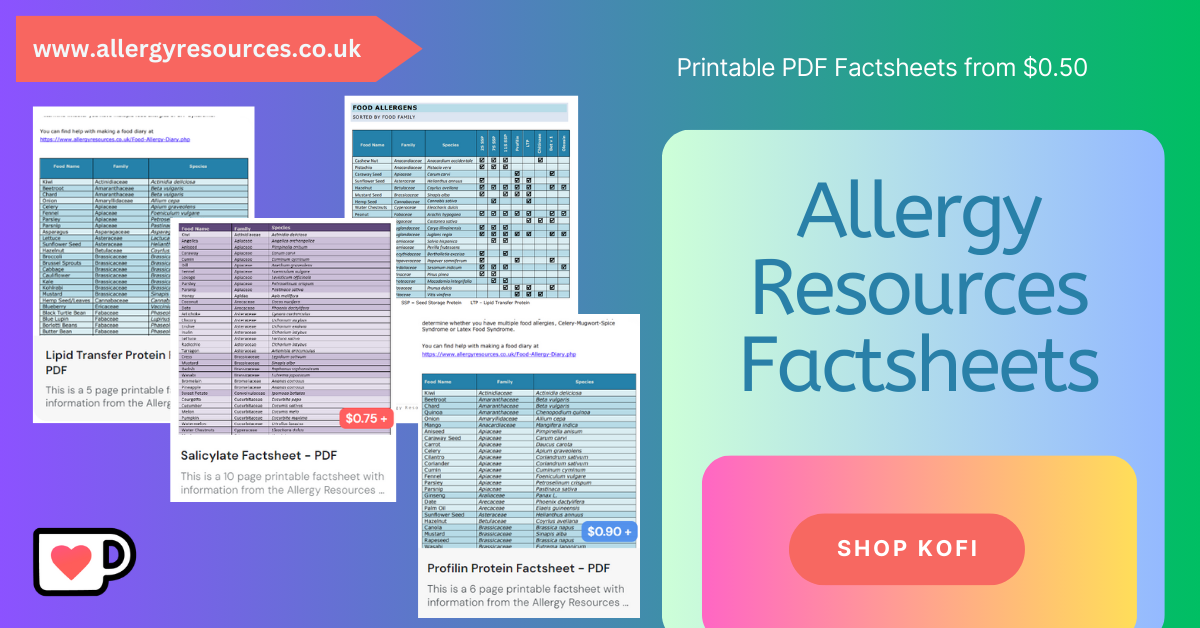
FENUGREEK ALLERGY
Key Allergens
Fenugreek (also known as methi) is a legume in the Fabaceae family of plants which also includes tamarind, soya, peanuts, peas and chickpeas.
There are no recorded allergens for fenugreek by the World Health Organization (WHO), because there have not been enough study into allergic effects from this food. If you are interested in what is needed by the WHO before they add an allergen to their allergen database you can check that out HERE.
Studies have shown that fenugreek contains 2S seed storage proteins, 7S seed storage proteins (also known as vicilin) and 11S seeds storage proteins (also known as legumin). These groups of proteins are commonly found in nuts, seeds and legumes.
A PR-10 plant pollen protein ('PR' meaning 'pathogenesis related' - related to plant defence against plant pathogens) has also been identified in fenugreek. These proteins are Bet v 1 -like proteins and if allergic to this particular protein can get oral allergy type symptoms.
There are no recorded allergens for fenugreek by the World Health Organization (WHO), because there have not been enough study into allergic effects from this food. If you are interested in what is needed by the WHO before they add an allergen to their allergen database you can check that out HERE.
Studies have shown that fenugreek contains 2S seed storage proteins, 7S seed storage proteins (also known as vicilin) and 11S seeds storage proteins (also known as legumin). These groups of proteins are commonly found in nuts, seeds and legumes.
A PR-10 plant pollen protein ('PR' meaning 'pathogenesis related' - related to plant defence against plant pathogens) has also been identified in fenugreek. These proteins are Bet v 1 -like proteins and if allergic to this particular protein can get oral allergy type symptoms.
Food Intolerances



Fenugreek is a low FODMAP food. FODMAP stands for Fermentable oligosaccharides, disaccharides, monosaccharides and polyols. Foods high in FODMAPs can cause symptoms of food intolerance, affecting the gastro intestinal system and this can be mistaken for a true IgE food allergy.
Fenugreek is a food high in salicylates. Salicylates have the potential to cause worsening of asthma, swelling, itching and hives as well as food intolerance symptoms in people who are sensitive to salicylates.
Fenugreek seeds contain a moderate amount of lectins, another cause of food intolerance. Cooking foods with lectins makes them more digestible and can reduce the symptoms of food intolerance.
You can read more about Food Intolerances on the dedicated Food Intolerance Page.
Associated Syndromes
Fenugreek contain Bet v 1 like proteins, so could be linked to Pollen Food Allergy Syndrome. You may have Pollen-Food Allergy Syndrome if you suffer from fenugreek allergy with oral allergy symptoms to 3 or more of the foods mentioned in the cross reactivity section.
Cross Reactivity
Other food containing 2S albumin seed storage proteins are cashews, peanuts, brazil nuts, mustard seed, rapeseed, turnip, chickpeas, hazelnuts, pistachio, buckwheat, soya, sunflower seeds, walnuts, kiwi, castor beans and sesame seeds.
Other foods containing 7S and 11S proteins not mentioned in the list above are lupin, lentils, macadamia, peas and mung beans.
If sensitised to Birch pollen you may have Pollen Food Allergy Syndrome and may also react to apple, carrot, kiwi, pear, peach, plum, nectarine, apricots, cherries, tomato, celery, potato, parsnip, pepper, cumin, peas, dill, fennel, hazelnut, walnut, almonds, coriander, peanuts, lentils and beans.
These food lists are not exhaustive, the most up to date information is on the Cross Reactivty Tool.
Other foods containing 7S and 11S proteins not mentioned in the list above are lupin, lentils, macadamia, peas and mung beans.
If sensitised to Birch pollen you may have Pollen Food Allergy Syndrome and may also react to apple, carrot, kiwi, pear, peach, plum, nectarine, apricots, cherries, tomato, celery, potato, parsnip, pepper, cumin, peas, dill, fennel, hazelnut, walnut, almonds, coriander, peanuts, lentils and beans.
These food lists are not exhaustive, the most up to date information is on the Cross Reactivty Tool.
Resources
Websites
Allergen Encyclopedia - FenugreekAnaphylaxis Campaign - Fenugreek (Also Known as Methi)
Articles and Journals
Fenugreek: New Therapeutic Resource or Emerging Allergen? 2024
Treatment and Strategy for Food Allergies in Paediatrics, 2024
Relevance of sensitization to legumes in peanut-allergic children, 2023
Hidden and Rare Food Allergens in Pediatric Age, 2023
Nutritional management of immediate hypersensitivity to legumes in vegetarians, 2022
Fenugreek: A hidden allergen to consider in peanut allergic patients, 2019
Fenugreek Anaphylaxis in a Pediatric Patient, 2018
Cross‐allergic Reactions to Legumes in Lupin and Fenugreek‐Sensitized Mice, 2012
Anaphylactic Reactions in Mice with Fenugreek Allergy, 2011
Allergy to Fenugreek (Trigonella foenum graecum), 1997
Let me know if you found any of these interesting or useful.
If you spot an article or research that you think is interesting you can message me or tag me on Facebook or Twitter - links at the bottom of the page.